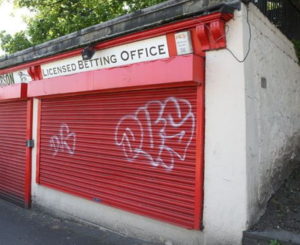GVC Confirms Revenue Numbers Still Going Up Despite FOBT Crackdown
 The owner of Ladbrokes and Coral, two of the biggest bookmakers with a high street presence in the United Kingdom, has released information looking at the financial numbers in the wake of the government’s decision to alter the maximum stake playable on Fixed Odds Betting Terminals.
The owner of Ladbrokes and Coral, two of the biggest bookmakers with a high street presence in the United Kingdom, has released information looking at the financial numbers in the wake of the government’s decision to alter the maximum stake playable on Fixed Odds Betting Terminals.
GVC have offered the first glimpse into how the betting industry has reacted to the downgrading of FOBT maximum stakes from £100 to £2, which gambling experts said would hit the industry hard and William Hill has claimed is behind their decision to close as many as 700 shops around the country.
GVC is the biggest company in the country in terms of numbers, boasting more than 3,400 betting shops courtesy of the Ladbrokes and Coral brands. Even so, they’ve released information that shows that sales are down by around 19% in their retail shops, which was in part thanks to a 39% drop in like-for-like machine sales.
Even so, the company admitted that things were not as bad as originally feared, with any losses being offset by an increase in online profits and international business. That meant that the company’s net gaming revenues were actually up 5% in the first half of the year.
Net Gaming Revenue Is Up
 There’s no question that the cut to the Fixed Odds Betting Terminals’ maximum stake has hit the bookmakers, given that the machines had previously been referred to as a ‘licence to print money’ .
There’s no question that the cut to the Fixed Odds Betting Terminals’ maximum stake has hit the bookmakers, given that the machines had previously been referred to as a ‘licence to print money’ .
Indeed, GVC has previously said that as many as 1,000 stores might have to close around the United Kingdom in order to help them cope with the change in stake. Added to that the fact that the conditions on the British high street have been tough in recent months and you can see why the various bookmakers have been concerned about how badly they will be hit by the change in maximum stake on the likes of the roulette game from £100 to £2.
Yet the numbers from GVC seem to suggest that industry has coped perfectly well, with website revenue up by 16% in the second quarter of the year and 17% on the first half of this year compared to last. That is in spite of the fact that the industry was boosted last year by the fact that the football World Cup was on during the summer.
Online sales have jumped 19% according to GVC, with net gaming revenues from Europe up 12% on the second quarter of the year, suggesting that foreign markets might prove to be the best way of the bookmakers coping with the loss in revenue from FOBTs.
Ladbrokes Coral ‘Well Placed’
 If the industry as a whole might be concerned about what the combination of the change to the Fixed Odds Betting Terminals’s maximum stake as well as the rise in the Point of Consumption Tax to 21% will do to it, GVC don’t seem overly concerned.
If the industry as a whole might be concerned about what the combination of the change to the Fixed Odds Betting Terminals’s maximum stake as well as the rise in the Point of Consumption Tax to 21% will do to it, GVC don’t seem overly concerned.
The government confirmed in October of 2018 that it would be moving the Remote Gaming Duty from 15% to 21% in order to help it cope with the loss in tax revenue that was naturally going to come about when the FOBT stake reduction was introduced. The RGD had been introduced as part of an amendment to the Gambling Act in 2014, allowing the government to earn some money from the ever-increasing industry of online gambling that it had previously been missing out on.
The Chief Executive of GVC, Kenneth Alexander, reacted to the firm’s latest figures by suggesting that he was happy with the way things were moving and that Ladbrokes and Coral were well-placed to take advantage of the current state of the market. He said:
“The transition to a post-£2 stakes-cut environment in UK retail is progressing very well and we believe the Ladbrokes Coral estate is best placed to take market share”.
The implication being that GVC were happy to see their overall profits go up, even if the amount of money being made from their high street shops was dropping at the same time.
Will This Make Store Closures Less Likely?
 The key thing that the government, bettors and those working in the 3,400 plus shops that are part of the GVC network will want to know is whether or not the overall profit being made by the company will make store closures less likely in the future.
The key thing that the government, bettors and those working in the 3,400 plus shops that are part of the GVC network will want to know is whether or not the overall profit being made by the company will make store closures less likely in the future.
The Association Of British Bookmakers has been warning since the discussion around the idea of cutting maximum stakes on FOBTs was first raised that it could have serious consequences for the presence of bookmakers on British high streets. They referred to the policy as ‘flawed’, suggesting that ‘over 20,000 jobs’ would be lost and ‘thousands of betting shops’ closed if the cut to the stake was introduced, which there was ‘no evidence’ to suggest would actually solve the issue of problem gambling.
A gambling analyst called Gavin Kelleher told the BBC that somewhere between 2,000 and 3,000 shops were likely to be closed in the coming months, with the William Hill closure of 700 shops almost certainly ‘just the start’. He made specific reference to GVC in his analysis, referencing the company’s announcement that they might close as many as 1,000 shops in the future. It would amount to about a third of the 8,400 shops that currently offer their services on the UK high street, with the major problem being that revenue growth in high street stores had flat-lined in recent years and the cut to the maximum stakes on Fixed Odds Betting Terminals was a ‘tipping point’ for the industry.
Whilst the government is obviously concerned about the job losses for people working in the bookmaking shops who will no longer be able to do so once they’ve shut their doors for the final time, the Business Minister Jake Berry said he thought that the government was doing the ‘right thing’ in trying to tackle the problem of machines that have been referred to as the ‘crack cocaine of gambling’. Berry said that the government was hoping that the closures of bookies would lead to a ‘more diverse high street’, adding, “They can’t all be hot food takeaways, charity shops, and bookmakers”. The decision as to whether the increase in profits announced by GVC will lead to fewer shops having to close down will largely depend on whether the Ladbrokes and Coral stores are able to break even moving forward.



